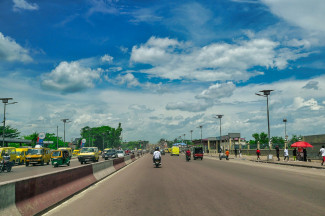For a new business owner, one international trade fair got things rolling
Biruktawit Begashaw started her own export company, Qine Trading, five years ago. After working for another agricultural exporter in Addis Ababa for seven years, she was ready to branch out on her own.
And, like any business owner just starting out, getting customers at first was tough.
“I got my license in August 2015 and I tried to get buyers, but couldn’t get any buyers until December 2015. I tried a lot of emails, and then I got two containers to New Jersey of seeds,” Begashaw said.
She got another boost when she was invited to attend Gulfood in Dubai by Ethiopia’s Ministry of Trade and Industry. Each year, the Ministry sponsors select businesses to attend the premier global food trade exhibition and join Ethiopia’s booth there.
[related-article]
Assefa Mulugeta, Director General of Export Promotions at the Ministry, said, “We have participated for the last eleven years. Gulfood is a very important event for us to get new markets and also to strengthen the existing markets. Dubai’s Gulfood trade fair is different from other exhibitions because the nature of the trade fair is not just in the trade exhibits but also to make actual contact.”
“Because of that our exporters really fight to participate in this trade fair and the number of exporters participating are increasing, and even some of the exporters are starting to have their own stands,” he added.
The country started small with 5-10 businesses attending, but now the Ministry hosts approximately 70 companies exhibiting in a rotating system in a 110-meter space. Those businesses deal in the goods Ethiopia is known for, i.e. coffee, spices, meat and textiles.
For the three years between 2016 and 2019, the Ministry’s exhibition and small businesses like Qine Trading were sponsored by the Enhanced Integrated Framework (EIF), coinciding with the programme’s mandate to support trade in the least developed countries (LDCs), of which Ethiopia is one.
“We got US$80 million in contracts for different organizations,” Mulugeta said of Ethiopia’s presence at the trade fair.
But, he noted that the country’s five-year plan is not yet achieved.
“We have an export target so we are striving to really get better exports of merchandise because the trade deficit is very wide. Our imports are very high and what we get from exports is low, so we need to fix our trade deficit,” he said.
“Our interventions with exports are very important, so our promotional efforts should to be strengthen our information systems, our logistics should be improved. We need more support.”
He added, “Promotion is investment. It needs a lot of money… we need more technical, promotion, digital promotion, we need to work on the marketing part. Capacity building is also one of the areas we are looking at – it’s not only having the conducive environment to promote, but also we need to have time to do outreach and to promote our products.”
For those small Ethiopian businesses like Qine Trading, sponsored attendance at trade fairs helps them get a foot in the door and to focus on promotion.
Begashaw said, “Gulfood is very, very important for me… when I participate in Gulfood I get very, very good buyers.”
She recalled arriving home from Dubai on a Friday and on Saturday had secured three containers worth of contracts. From that first year of participation, she forged relations with three important buyers, resulting in 20 containers worth of goods delivered.
“If we don’t have a booth we don’t have any chance. I participate in other trade fairs on my own but it is very tiresome, so participating with the Ministry of Trade is a good opportunity for us. And not only for us but there are also good business opportunities for other Ethiopians,” Begashaw said.
As for Qine Trading’s business plan, Begashaw said she is looking to expand her coffee sales.
“I plan to work on specialty coffee. In the long run I need to process the coffee here and I need to pack it into small quantities, like in 1-kg or 500-gram bags. My plan is to add some value and to export coffee. Now I am exporting raw coffee,” she said.
“I love coffee,” she added.
And as for other trends in Ethiopia’s agricultural export landscape, she cited more international competition and flagged two specific commodities – fava and mung beans.
“Last year fava beans were in big demand because I think Canada produced fava beans and the weather was not good, so there was a shortage in the market so Ethiopian fava beans were in high demand and exported a lot last year. And every year it’s different as far as other countries and competitor’s harvesting,” Begashaw said.
“There is a lot of demand for green mung beans, mostly from India, but Indians are not mostly buying from us but from China. And Indonesia is buying a lot. Our green mung beans differ from the others because of the germinating, so they love our green mung beans,” she aded.
If you would like to reuse any material published here, please let us know by sending an email to EIF Communications: eifcommunications@wto.org.


